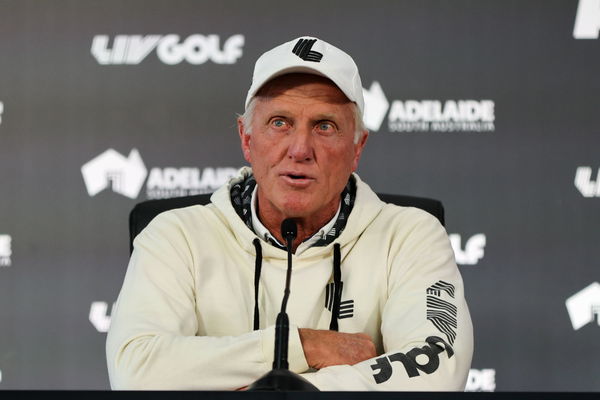
Imago
LIV GOLF ADELAIDE PREVIEW, LIV Golf CEO and Commissioner Greg Norman, Cameron Smith captain of Ripper GC and South Australian Premier Peter Malinauskas speak to media during a press conference, PK, Pressekonferenz at the Grange Golf Club in Adelaide, Thursday, April 20, 2023. ACHTUNG: NUR REDAKTIONELLE NUTZUNG, KEINE ARCHIVIERUNG UND KEINE BUCHNUTZUNG ADELAIDE SA AUSTRALIA PUBLICATIONxINxGERxSUIxAUTxONLY Copyright: xMATTxTURNERx 20230420001788571723| Credits: Imago

Imago
LIV GOLF ADELAIDE PREVIEW, LIV Golf CEO and Commissioner Greg Norman, Cameron Smith captain of Ripper GC and South Australian Premier Peter Malinauskas speak to media during a press conference, PK, Pressekonferenz at the Grange Golf Club in Adelaide, Thursday, April 20, 2023. ACHTUNG: NUR REDAKTIONELLE NUTZUNG, KEINE ARCHIVIERUNG UND KEINE BUCHNUTZUNG ADELAIDE SA AUSTRALIA PUBLICATIONxINxGERxSUIxAUTxONLY Copyright: xMATTxTURNERx 20230420001788571723| Credits: Imago
Hughes Norton, the so-called “superagent” of both Tiger Woods and Greg Norman, gained incredible prominence in the late 1990s. However, his fortunes shifted dramatically when both Norman and Woods fired him, which forced him out of the limelight for years. That was until he made a return to the spotlight with his 2024 book, “Rainmaker.” While his chronicle about both sports giants stands out, his portrayal of Norman is particularly harsh. Consider how he describes Norman: a “swaggering narcissist. … Golf was primarily a means to an end for him.” Ouch? And although Norman has been absent from the golf scene ever since dropping his LIV Golf duties, his former superagent has more things to say about him.
Watch What’s Trending Now!
In a recent appearance on GOLF Subpar, Norton sparks the much-needed conversation about Greg Norman by highlighting what made Norman stand out as a potential client. “In Greg’s case, blonde, blue-eyed, you know, broad-shouldered, commands the room, great sense of humor, loved the media, and they loved him. You know, terrific talent.” Norton follows his comment by mentioning Jack Nicklaus‘s praise of Norman’s driving skills in 2018, “[Greg] Norman’s gotta be (up there)…” During his prime, Norman consistently ranked among the top 10 in driving distance for nine seasons.
But, hey, Norton is not here to praise his former client! Norton brings in Norman’s spectacular 1986 chaos, where he led all four majors after 54 holes and won only one (The Open), and continues, “But he only converted one of those, of course. And people then, you know, he ended up winning only two majors. I joke now that the LIV Tour, right, that Greg fronted and promoted… LIV is Roman numerals for 54. And I joke now that if majors had been 54 holes instead of 72, Greg would have 7 instead of 2.” And, hey, even Norman “fronted LIV” plays 54 holes! Talk about coincidence.
However, instead of dwelling on what could have been, let’s focus on what Norman achieved: 20 Tour titles and 2 majors, including The Open in 1986 and 1993. While he might have accomplished more—considering his 1996 Masters collapse—Norton’s comment is personal. And this isn’t even the first time he took a dig at Norman’s association with LIV.
View this post on Instagram
In his book Rainmaker, Norton dedicated two chapters to the 11 years he spent representing the “narcissistic” Norman. He accuses Norman of taking Mark McCormack’s sales pitch for a second tour and rebranding it as LIV Golf nearly 50 years later. Although Norman has never directly confronted this accusation, it is intriguing nonetheless. But not everything turned out poorly in their partnership. Per Norton’s book, he facilitated the generation of $50 million for Norman, which was over five times greater than his on-course earnings during that same timeframe. But Norman’s not the only victim of Norton’s harsh words.
Hughes Norton is just as ruthless towards his other client, Tiger Woods
Hughes Norton soared high in his career when Tiger Woods and Greg Norman were on his team; however, after their eventual fallout, he has been quite spiteful. We have already seen his thoughts on Norman, so here’s what he feels about Tiger Woods. In Rainmaker, Hughes Norton offers an insider’s perspective on his time representing Tiger Woods, highlighting both monumental successes and the eventual fallout. He recalls the pivotal moment in August 1996 when he joined Team Tiger, orchestrating a groundbreaking $60 million endorsement deal with Titleist and Nike.
However, this success was short-lived. On September 26, 1998, Norton received a shocking dismissal from Woods, who delivered the news in an “emotionless” manner. Reflecting on the abrupt end of their relationship, Norton writes, “The worst part honestly was that there was no explanation.” This sense of betrayal lingered, especially as the loss of Woods led to Norton’s termination from IMG just two months later.
But he isn’t done. Not yet. Following the dismissal, Norton drew on a back catalog of locker room experiences and intimate conversations to illustrate his point. He describes Woods as “unbelievably self-centered,” focusing solely on his ambition to become the greatest golfer in history. “Tiger was unbelievably self-centered,” he says.
“He focused on one thing and one thing only from an early age, which was to become the greatest golfer in the history of the game. He was quite selfish; his needs were all that mattered. He never really learned how to interact with people, so there was a total lack of empathy.” This obsession, he argues, resulted in a significant lack of social skills and empathy. Who do you believe more?


